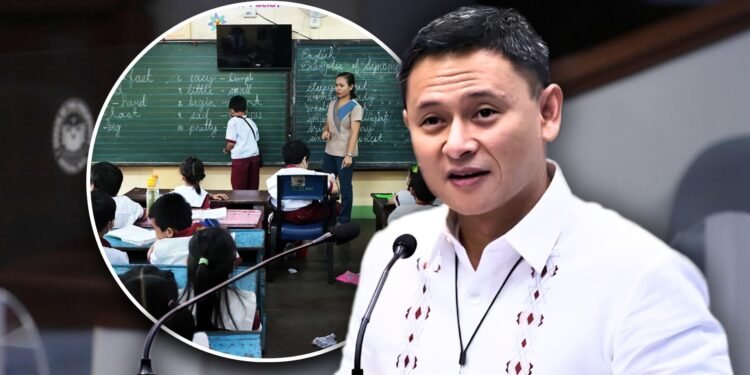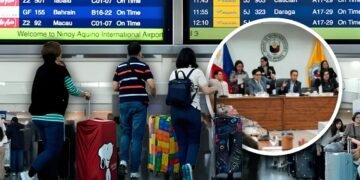Education Secretary Sonny Angara announced that the PHP1.044 trillion budget approved for the DepEd Philippines in 2026 is the highest education allocation in Philippine history. The funding increase signals full government backing for the ongoing reforms meant to fix the learning crisis, strengthen accountability, and address severe infrastructure shortages.
The Senate reinforced the budget by adding PHP77 billion to the amount earlier passed by the House of Representatives. Angara said the proposed allocation will speed up the reform process. “Every peso added to the budget is a vote of confidence in our direction,” he said. He added that the government intends to match that confidence with results. “It signals that Congress and the people expect us to deliver and we intend to meet that expectation with transparency, urgency, and integrity.”
The biggest jump is in learning materials. PHP29.29 billion is earmarked for textbooks and learning resources, more than doubling previous funding. The amount will support the production of more than 79 million materials for early grade levels. School-based feeding programs also received a major boost, with PHP28.66 billion set to feed 4.49 million Kindergarten and Grade 1 learners, along with severely wasted students from Grades 2 to 6.
Disaster response and school safety systems are strengthened with PHP3.77 billion in funding. The allocation covers emergency operations centers, new micro weather stations, temporary learning spaces, and clearing operations for around 4,227 schools. Infrastructure spending rises sharply from PHP28.06 billion to PHP85.41 billion. The expanded budget will support the construction of 25,527 new classrooms, repairs for 11,886 rooms, and the completion of unfinished school buildings.
A significant portion of the budget is dedicated to personnel support. Funds are set to cover 323,916 new teaching items, 6,000 principal positions, 10,000 Administrative Officer II posts, and 5,000 Project Development Officer I roles. The plan includes wider allocations for teacher benefits and laptops for educators. Angara said the expanded funding “gives us the room to fix what needs fixing” and reflects confidence in the reforms underway.
The 2026 education budget aligns with the learning recovery agenda directed by President Bongbong Marcos. DepEd will retain full support for all 98,401 tutors under the ARAL program, continue expanding digital resources, and push curriculum renewal efforts that emphasize transparency and measurable outcomes. Additional programs receiving increased support include the Last Mile Schools initiative, Indigenous Peoples education, Special Needs Education, and Madrasah Education.
DepEd maintains that the scale of the 2026 budget answers the urgency of the learning crisis and positions the agency to deliver long-delayed improvements across the system starting next year. Education Secretary Sonny Angara announced that the PHP1.044 trillion budget approved for the Department of Education in 2026 is the highest education allocation in Philippine history. The funding increase signals full government backing for the ongoing reforms meant to fix the learning crisis, strengthen accountability, and address severe infrastructure shortages.
The Senate reinforced the budget by adding PHP77 billion to the amount earlier passed by the House of Representatives. Angara said the proposed allocation will speed up the reform process. “Every peso added to the budget is a vote of confidence in our direction,” he said. He added that the government intends to match that confidence with results. “It signals that Congress and the people expect us to deliver and we intend to meet that expectation with transparency, urgency, and integrity.”
The biggest jump is in learning materials. PHP29.29 billion is earmarked for textbooks and learning resources, more than doubling previous funding. The amount will support the production of more than 79 million materials for early grade levels. School-based feeding programs also received a major boost, with PHP28.66 billion set to feed 4.49 million Kindergarten and Grade 1 learners, along with severely wasted students from Grades 2 to 6.
Disaster response and school safety systems are strengthened with PHP3.77 billion in funding. The allocation covers emergency operations centers, new micro weather stations, temporary learning spaces, and clearing operations for around 4,227 schools. Infrastructure spending rises sharply from PHP28.06 billion to PHP85.41 billion. The expanded budget will support the construction of 25,527 new classrooms, repairs for 11,886 rooms, and the completion of unfinished school buildings.
A significant portion of the budget is dedicated to personnel support. Funds are set to cover 323,916 new teaching items, 6,000 principal positions, 10,000 Administrative Officer II posts, and 5,000 Project Development Officer I roles. The plan includes wider allocations for teacher benefits and laptops for educators. Angara said the expanded funding “gives us the room to fix what needs fixing” and reflects confidence in the reforms underway.
The 2026 education budget aligns with the learning recovery agenda directed by President Marcos. DepEd will retain full support for all 98,401 tutors under the ARAL program, continue expanding digital resources, and push curriculum renewal efforts that emphasize transparency and measurable outcomes. Additional programs receiving increased support include the Last Mile Schools initiative, Indigenous Peoples education, Special Needs Education, and Madrasah Education.
DepEd maintains that the scale of the 2026 budget answers the urgency of the learning crisis and positions the agency to deliver long-delayed improvements across the system starting next year.












